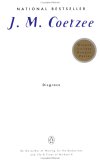Book Club Discussion Questions
In a book club? Subscribe to our Book Club Newsletter and get our best book club books of 2025!
Please be aware that this discussion guide will contain spoilers!
- The novel begins by telling us that "For a man his age, fifty-two,
divorced, he has, to his mind, solved the problem of sex rather well."
What can you infer about David Lurie's character from this sentence? In what
ways is it significant, particularly in relation to the events that follow,
that he views sex as a "problem" and that his "solution"
depends upon a prostitute?
- Lurie describes sexual intercourse with the prostitute Soraya as being
like the copulation of snakes, "lengthy, absorbed, but rather
abstract, rather dry, even at its hottest." When he decides to
seduce his student, Melanie, they are passing through the college gardens.
After their affair has been discovered Melanie's father says that he never
thought he was sending his daughter into "a nest of vipers."
Lurie has also written a book about Faust and Mephistopheles and explicates
for his class a poem by Byron about the fallen angel, Lucifer, whom Lurie
describes as being "condemned to solitude." What do you
think Coetzee is trying to suggest through this confluence of details? How
clearly does Lurie himself understand his behavior? How does his reading of
the Byron poem prefigure his own fate?
- When Lurie shows up unexpectedly at Melanie's flat, "she is too
surprised to resist the intruder who thrusts himself upon her."
Later, he tells himself that it was "not rape, not quite that, but
undesired nevertheless, undesired to the core." How do you view
what happens in this scene? Is it rape?
- How would you characterize Lurie's attitude before the academic committee
investigating the charges of harassment brought against him? Is the
committee justified in asking for more than an admission of guilt? Why does
Lurie refuse to assent to the fairly simple demands that would save his job?
What consequences, practical and spiritual, follow from this refusal?
- Lurie claims that in his relationship with Melanie, he was "a
servant of Eros" and that his case rests on the rights of desire.
On the God who makes even the small birds quiver." Is this an
acceptable explanation of his actions? Do you think it is sincere?
- What parallels do you see between the attack on Lurie and his daughter
Lucy and Lurie's own treatment of Melanie and Melanie's father? To what
extent do you think Coetzee wants us to see Lucy's rape as a punishment for
Lurie's undesired sexual encounter with Melanie? Is this an instance of the
sins of the father being visited upon the child?
- In the course of the attack, Lurie is burned and blinded, temporarily, in
one eye. What symbolic value might attach to these events? In what other
ways has Lurie been blind? What significance does fire have for him?
- Why does Lucy refuse to report her rape? How is her decision related to
the changed relations between blacks and whites in post-apartheid South
Africa? Why does she accept Petrus' protection even after he has been
implicated in the attack?
- How do you feel about Lucy's neighbor Petrus? To what extent do you think
he was involved in the attack? What are his motives? What are the motives of
the attackers? In what ways does Petrus embody the transition South Africa
is making between apartheid and democracy? In what sense will Lucy's child
also represent that transition?
- During a heated argument about whether animals have souls and how they
should be treated, Lurie tells his daughter: "As for the animals, by
all means let us be kind to them. But let us not lose perspective. We are of
a different order of creation from the animals. Not higher necessarily, just
different. So if we are going to be kind, let it be out of simple
generosity, not because we feel guilty or fear retribution." In
what ways does this speech echo the logic of racial oppression and
apartheid?
- Throughout Disgrace, Lurie contemplates writing an opera based on
Byron's last years in Italy. Why is he so drawn to Byron? How does Byron's
situation in Italy resemble Lurie's own? What ironies do you see in the fact
that Lurie composes the music for his opera on a banjo and that he considers
including a part for a dog?
- From virtually the first page to the last, David Lurie suffers one
devastating humiliation after another. He loses his job and his reputation.
He is forced to flee Cape Town to live with his daughter on her smallholding
in the country. There he is beaten and burned and trapped helplessly in the
bathroom while his daughter is raped. Finally, he ends up ferrying dead dogs
to the incinerator. Is there a meaning or purpose in his suffering? Is he in
some way better off at the end of the novel than he was at the beginning?
How has he changed?
- Disgrace is narrated in the present tense, largely through David
Lurie's consciousness, though not in the first person. What effect does this
method of narration have on how the story unfolds? How would the novel
differ if told in the past tense? At what points do you sense a divergence
between Lurie's view of himself and the narrator's view of him?
- In what ways can the events dramatized in Disgrace be seen as a
result of South Africa's long history of racial oppression? What does the
novel imply about the larger themes of retribution and forgiveness and
reversals of fortune? About the relation between the powerful and the
powerless?
Unless otherwise stated, this discussion guide is reprinted with the permission of Penguin.
Any page references refer to a USA edition of the book, usually the trade paperback version, and may vary in other editions.
